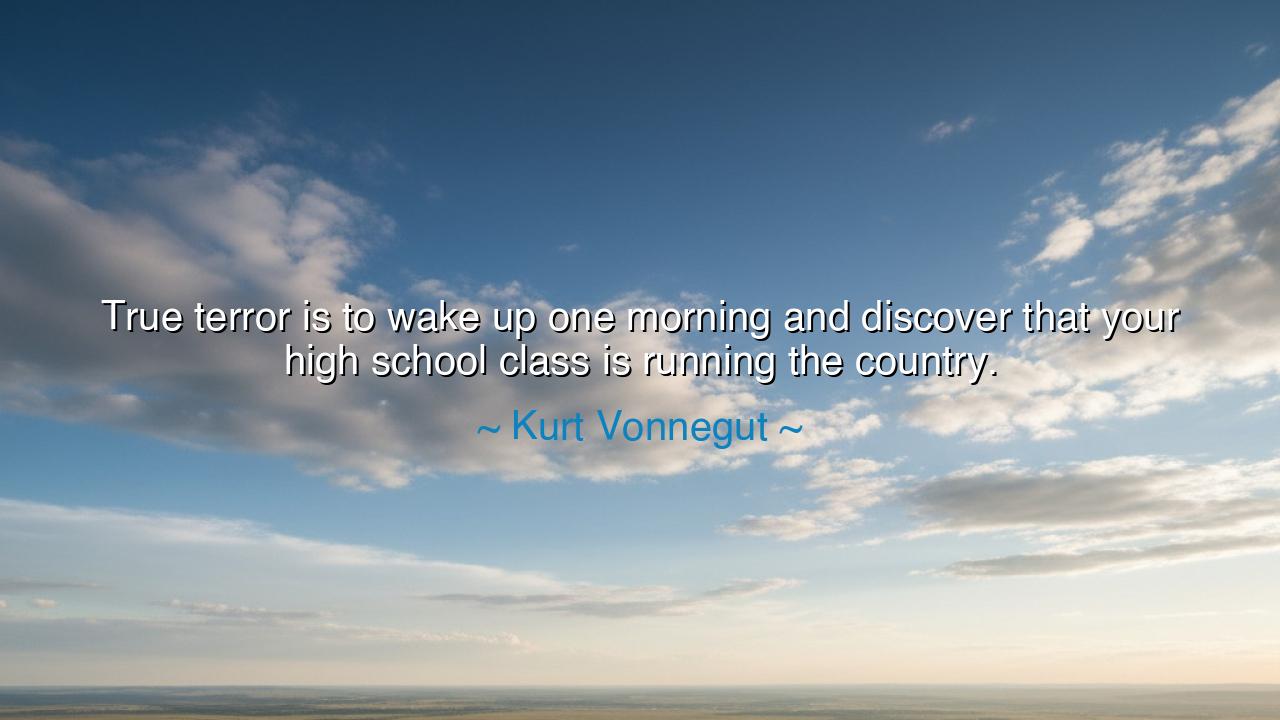
True terror is to wake up one morning and discover that your high
True terror is to wake up one morning and discover that your high school class is running the country.






"True terror is to wake up one morning and discover that your high school class is running the country." These words, spoken by the sharp and satirical Kurt Vonnegut, cut to the heart of a deeply unsettling truth about the nature of power, leadership, and the forces that shape the world. In his inimitable way, Vonnegut reminds us that the people who often rise to positions of authority and influence are not necessarily the most qualified or wise, but rather those who simply happen to find themselves in the right place at the right time. The terror, as Vonnegut puts it, is that those who once sat in the same classrooms as ourselves—those we once considered immature, unrefined, and perhaps unfit for greatness—may one day hold the reins of power, guiding the destiny of nations, making decisions that will affect the lives of millions.
The essence of Vonnegut's words speaks not only to the folly of youthful arrogance, but to the humbling realization that institutions of power are often not the domain of the most deserving, but of the most opportunistic. The high school class Vonnegut refers to is a metaphor for the imperfect, flawed, and immature nature of human beings, yet these same individuals, with all their weaknesses and failings, are sometimes thrust into positions where they are called upon to wield enormous influence. To think that high school peers—those we once saw as uncertain, vulnerable, or even reckless—might one day determine the fate of nations can be a source of fear, for it speaks to the randomness and lack of accountability in how power is distributed.
Look to the history of Rome, where the great emperors who shaped the course of the empire were often no more than figures of fortune, rising not because of merit, but because of political maneuvering and the whims of fate. Julius Caesar, for example, though a brilliant military mind, was also a man who understood the mechanics of power—how to manipulate the masses, how to gain the favor of those in the right positions, and how to rise through the ranks despite a personal history filled with contradictions. Caesar’s rise to power was not solely due to his military genius, but because he was able to navigate the complexities of a world that often rewarded ambition over virtue. In the same way, we can see how individuals with far less wisdom or foresight might stumble into the halls of leadership, relying on luck, timing, and connections rather than wisdom or integrity.
Vonnegut's fear of the high school class running the country is a recognition of this harsh reality—that often the people who find themselves in positions of great authority are those who have mastered the art of manipulation, who are skilled in the game of politics and power, but who may lack the wisdom and maturity to wield it responsibly. This mirrors the world of youth, where the lack of experience and worldly knowledge can result in reckless decisions and impulsive actions. When these same young people eventually rise to power, they may bring the same impulsive nature and lack of foresight into the world of governance, with dangerous consequences.
Yet, the deeper lesson in Vonnegut’s words is not merely to lament this fate, but to call us to action. If it is indeed the immature and unqualified who rise to power, then we must ask ourselves: how are we, as citizens, as leaders, as humans, allowing this to happen? The responsibility of shaping the future falls not only on those in power but on each of us. History teaches us that the greatest civilizations are built not on the shoulders of the most powerful individuals alone, but on the collective will of those who demand accountability from their leaders, who educate themselves, and who ensure that only the most worthy rise to positions of leadership.
We must engage with the world around us—not as passive observers, but as active participants in the civic process. Whether we are voting, educating the next generation, or holding those in power accountable, we each play a part in ensuring that good judgment and wisdom remain at the helm. We must seek out leaders who are not driven solely by ambition, but by principles, by a desire to serve the greater good, and by an understanding that leadership is a responsibility, not a privilege.
In our own lives, let us not become passive bystanders in the drama of life. Let us strive to be the wise leaders, the thoughtful thinkers, and the conscious citizens who understand that the future of the world is shaped not by the lucky few, but by the collective efforts of those who refuse to accept mediocrity, who are willing to challenge the status quo, and who demand that those in power be held to the highest standards. Let us ensure that the high school class, with all its impulsiveness and naiveté, does not take the reins of our nations without the careful oversight of those who understand the depth of responsibility that comes with power. For in the end, it is not just the fate of the few but the future of us all that is at stake.






AAdministratorAdministrator
Welcome, honored guests. Please leave a comment, we will respond soon